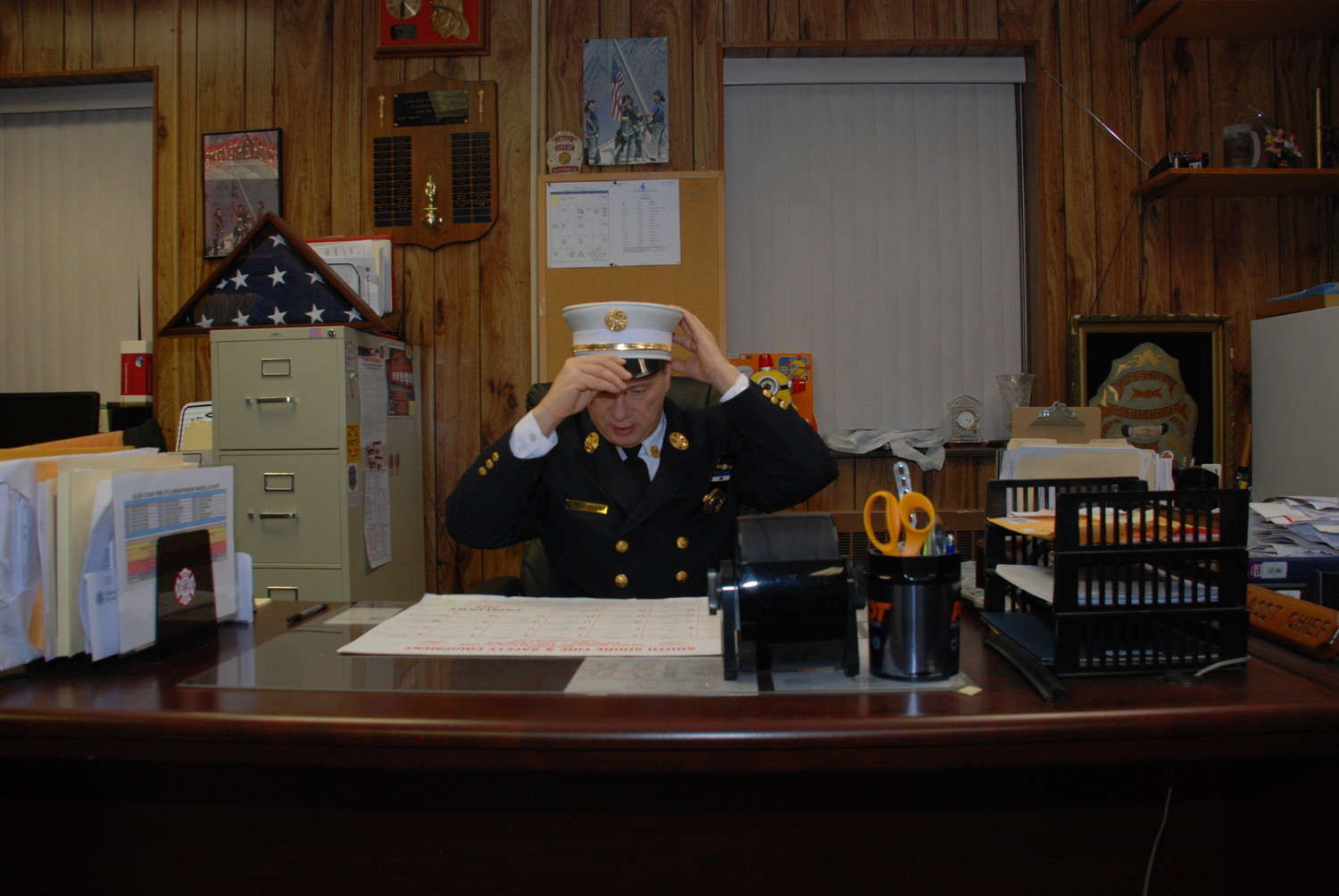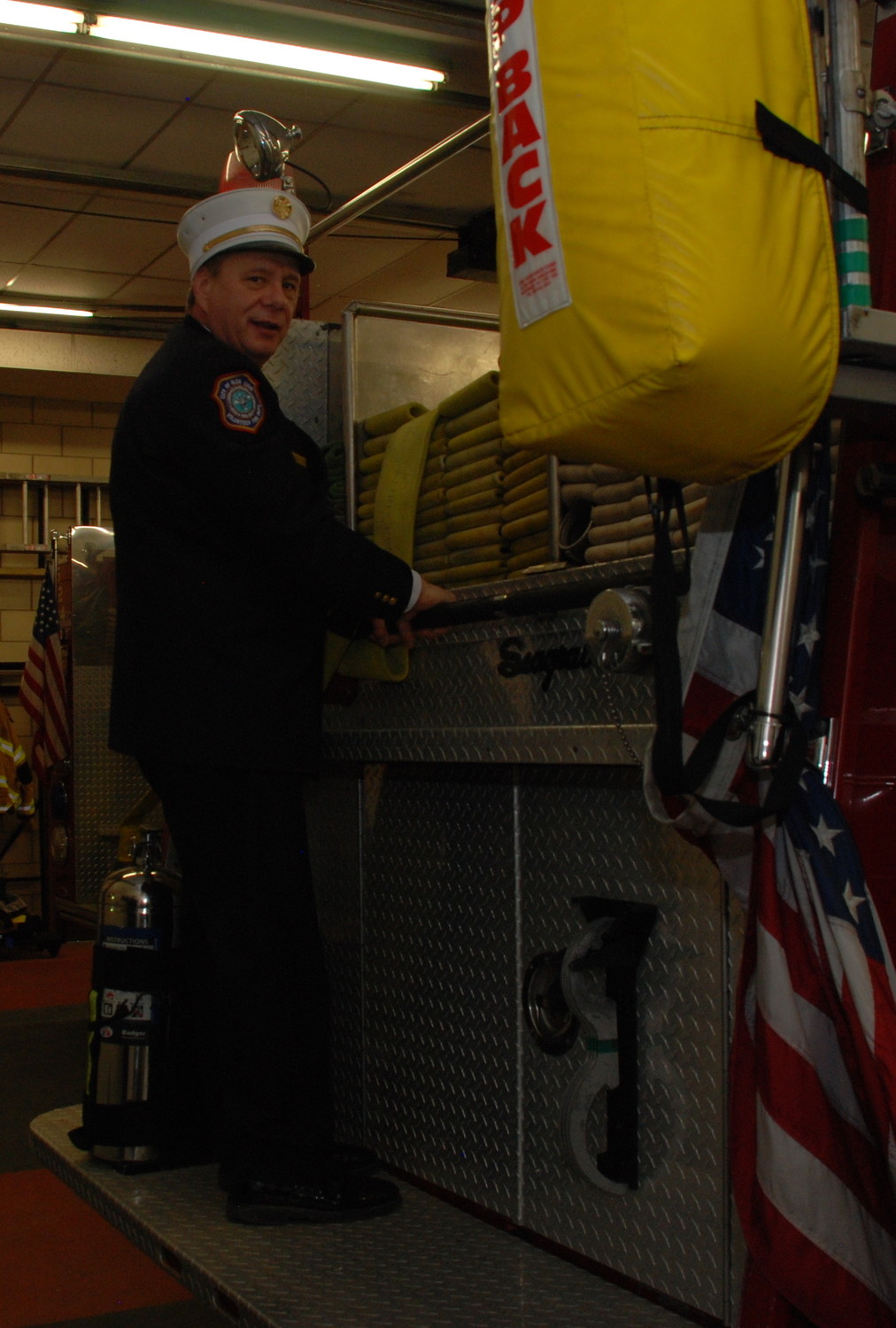New chief Marino takes Glen Cove F.D. reins
Culminating a lifetime of training
Robert Marino was 6 when he got his first taste of firefighting. “There used to be an amusement park called Freedomland,” he recalled, “and there was this simulation of the great Chicago fire.” He remembered the excitement of pumping water up to fight the “blaze,” which was created by gas jets tucked behind the building’s façade.
Now 62 years old, the excitement of firefighting never left him. The new chief of the Glen Cove Fire Department said that when he was a teenager in the 1960s, he often chased fire calls in his car. The alarms came in coded blasts from a horn atop the station, indicating the location of the fire.
“When the dispatcher got a call, they would blow a code out over the horn, and you’d look at your chart,” he explained, referring to a list of the codes and what they meant. Then he would jump in his car and head to the blaze to watch the firefighters put it out.
“My mother would listen for the codes, too,” Marino added. “We’d hear the alarm, and she’d go over and check the chart on the wall and an-nounce, ‘Fire at the hospital!’ Every house in Glen Cove had one of these. That’s the way it was back in those days.”
Nowadays, with the department’s emphasis on safety, non-firefighters are not allowed near the scene of an active fire under any circumstances, and even members of Fire Explorers — a youth program for aspiring firefighters — can be disciplined for showing up at an active fire.
Marino remembered other procedures from bygone days when safety was less of a priority. “We used go to calls standing on the backboard, holding onto the rail for dear life,” he said.
He joined the Glen Cove department as soon as he turned 21, in 1977. Back then, he said, there was no five-year probationary period for new members before being allowed to go on calls, as there is today. “In those days,” he said, “you were ‘baptized by fire,’ as the saying goes.”
He had been a student at Nassau Community College, where he studied criminal justice, thinking he would become a police officer. But his less-than-perfect vision — which he has since corrected with laser eye surgery — put an end to that idea.
He took a job at his father’s dry-cleaning business in Locust Valley, which opened in 1956 and is still in operation, now run by Robert’s sister.
But the Fire Department became a family business, in a different way. Though he was the first member of his family to join, he met his future wife on her frequent visits to the firehouse to see her father, the late ex-chief Howard Tripp, and brother, ex-Chief Anthony Tripp. Marino’s brother-in-law, Frank Basile, and son, Michael, both now serve in the department.
In his 40 years with the department, Marino has served as the captain of the Chemical Company three times, and he was a company lieutenant for seven years. In 1984 he got a part-time job as dispatcher at the department, and transitioned to full time in 1990. In 2012, he became 3rd assistant chief — “baby chief,” as the position is affectionately known by higher-ups. He worked his way up in successive two-year terms through 2nd and 1st assistant, and was awarded the highest rank in the department earlier this month.
Former Chief David Spy said that as the leader of the department, one’s perspective changes. He recalled a time before he was a chief when he wanted to go deeper into a blaze, but the 3rd chief wouldn’t let him.
“I told him after, ‘That was the right call,’” Spy said. “I didn’t like it, but it was right. And he told me, ‘If I wasn’t a chief, I’d be the one saying, Let’s get in there.”
Marino agreed, adding, “There’s things you can see from the outside of a fire you can’t see from the inside. We’re aggressive. We want to go in and get that job done. But sometimes you’ve got to make that hard decision.”
In general, however, the decision to face down danger in order to help people is an easy one, Marino said. Hurricane Sandy struck during his first year as “baby chief.” “We went down to a call on Shorecrest,” he recounted. “We could hear the trees crashing all around us. All we needed was for one tree to come crashing down on the car and that’d be it. Good night, nurse.”
In moments like that, he said, “If you’re not scared, you’re not human. But we’ve got a job to do.”
Asked how he overcomes that fear, Marino seemed puzzled, as though he had been asked how he breathes. “You just do,” he said. “I’ve been doing it for a while. When you know the job’s gotta be done, you make every effort to get it done. You just do it.”

 50.0°,
Overcast
50.0°,
Overcast 







